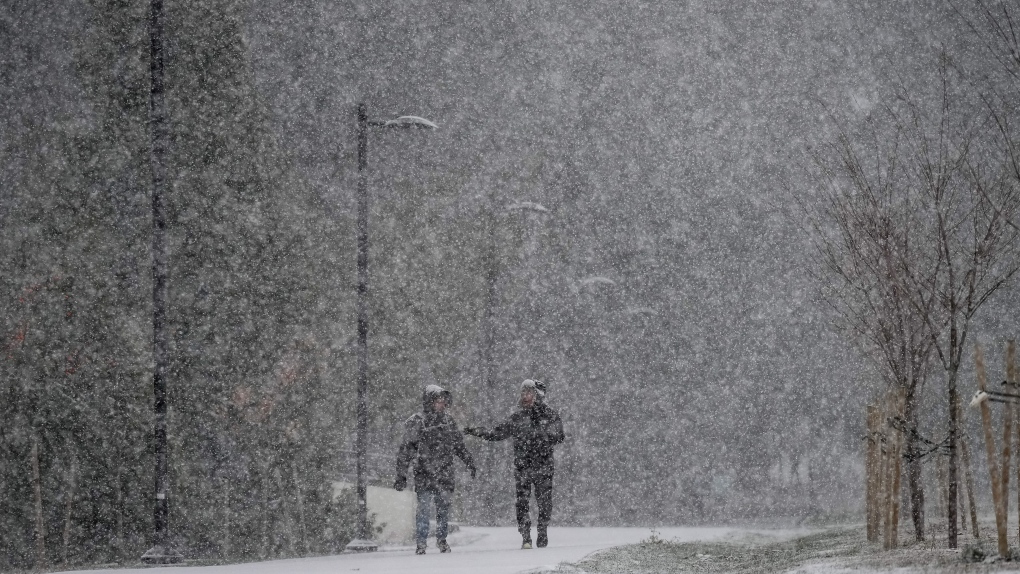
Half of Canadians have negative opinion of latest Liberal budget: poll
A new poll suggests the Liberals have not won over voters with their latest budget, though there is broad support for their plan to build millions of homes.
Despite warm and mild temperatures stretching on throughout most of the fall season, the wrath of winter may be coming soon, experts say. But frigid temperatures aren’t expected to last.
According to a report by The Weather Network, Canadians should prepare for colder-than-normal temperatures across most of the country in December.
Following a chilly finale to 2022, however, temperatures are expected to fluctuate.
“We expect that once we get into January and February, winter will take a couple of breaks with periods of mild weather, especially from southern Ontario to Newfoundland and Labrador,” meteorologist Doug Gillham writes in The Weather Network report.
For the third straight year, Canada’s winter weather is expected to be primarily influenced by the large-scale climate pattern known as La Nina – correlated with cooler than normal water surface temperatures in the central and eastern equatorial Pacific Ocean.
But La Nina isn’t the only weather phenomenon predicted to drive Old Man Winter’s rage. Add to the mix a piece of the polar vortex, which the Weather Network projects to be located over northern Canada, blowing substantial levels of Arctic air south during the would-be cool December.
As we head into January and February, La Nina is expected to bring the cold and active winter weather across Western Canada, while channelling milder and stormy conditions from the Great Lakes to Atlantic Canada.
However, The Weather Network notes the wintry weather out west at times may shift east, to an area spanning from the eastern Prairies to Quebec, resulting in milder weather in British Columbia and Alberta.
As a result, The Weather Network says Canadians will be confronted with a “two-faced winter” – one that will “feature extended periods of harsh winter weather, and extended periods of milder weather that may leave you wondering, “what happened to winter?””

A new poll suggests the Liberals have not won over voters with their latest budget, though there is broad support for their plan to build millions of homes.
Appointing a trusted person to help with financial obligations can give you peace of mind. In his personal finance column for CTVNews.ca, Christopher Liew outlines the key benefits of naming a confidant to take over your financial responsibilities, if the need ever arises.
A Toronto couple are speaking out about their “extremely dangerous” experience on board a sinking tour boat in the Dominican Republic last week.
A Winnipeg man said a single date gone wrong led to years of criminal harassment, false arrests, stress and depression.
The federal government has added $36.4 million to a program designed to support people who have been seriously injured or killed by vaccines since the end of 2020.
A photographer who worked for Megan Thee Stallion said in a lawsuit filed Tuesday that he was forced to watch her have sex, was unfairly fired soon after and was abused as her employee.
An Ontario senior’s attempt to get technical help online led him into a spoofing scam where he lost $25,000. Now, he’s sharing his story to warn others.
A Minnesota state senator and former broadcast meteorologist told police that she broke into her stepmother's home because her stepmother refused to give her items of sentimental value from her late father, including his ashes, according to burglary charges filed Tuesday.
When identical twin sisters Kim and Michelle Krezonoski were invited to compete against some of the world’s most elite female runners at last week’s Boston Marathon, they were in disbelief.

When identical twin sisters Kim and Michelle Krezonoski were invited to compete against some of the world’s most elite female runners at last week’s Boston Marathon, they were in disbelief.
The giant stone statues guarding the Lions Gate Bridge have been dressed in custom Vancouver Canucks jerseys as the NHL playoffs get underway.
A local Oilers fan is hoping to see his team cut through the postseason, so he can cut his hair.
A family from Laval, Que. is looking for answers... and their father's body. He died on vacation in Cuba and authorities sent someone else's body back to Canada.
A former educational assistant is calling attention to the rising violence in Alberta's classrooms.
The federal government says its plan to increase taxes on capital gains is aimed at wealthy Canadians to achieve “tax fairness.”
At 6'8" and 350 pounds, there is nothing typical about UBC offensive lineman Giovanni Manu, who was born in Tonga and went to high school in Pitt Meadows.
Kevin the cat has been reunited with his family after enduring a harrowing three-day ordeal while lost at Toronto Pearson International Airport earlier this week.
Molly Knight, a Grade 4 student in Nova Scotia, noticed her school library did not have many books on female athletes, so she started her own book drive in hopes of changing that.
 Heavy snow falls as pedestrians walk through Central Park in Burnaby, B.C., Nov. 29, 2022. THE CANADIAN PRESS/Darryl Dyck
Heavy snow falls as pedestrians walk through Central Park in Burnaby, B.C., Nov. 29, 2022. THE CANADIAN PRESS/Darryl Dyck